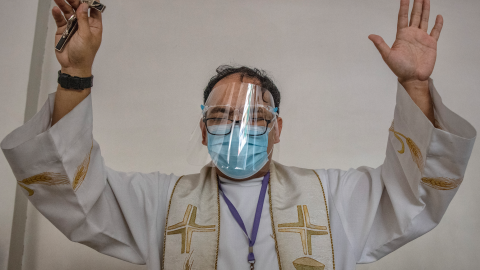Why ‘Christian nationalists’ are less likely to wear masks and social distance

Ezra Acayan/Getty Images
- A new study used survey data to examine the interplay between Christian nationalism and incautious behaviors during the COVID-19 pandemic.
- The researchers defined Christian nationalism as “an ideology that idealizes and advocates a fusion of American civic life with a particular type of Christian identity and culture.”
- The results showed that Christian nationalism was the leading predictor that Americans engaged in incautious behavior.
After the U.S. began battling the coronavirus in February, it didn’t take long for Americans to make the battle part of the culture war. The left, in general, framed mandatory shutdowns and precautionary behaviors as a moral duty, while parts of the right viewed these reactions not only as overreactions, but as a threat to freedom, coming from untrustworthy sources.
But why? What are the forces or ideas causing so many Americans to behave in ways that are demonstrably exacerbating the spread of COVID-19?
To better understand, some pollsters have examined not only Americans’ political views, but also their religious attitudes. The results have suggested that religious Americans — in particular, white evangelicals — are less likely to practice precautionary measures, like mask-wearing and social distancing.
But a new study argues that looking at broad religious attitudes only offers part of the picture.
Published in the Journal for the Scientific Study of Religion, the study suggests that the far right’s behavioral response to the pandemic is largely shaped by Christian nationalism, which they define as “an ideology that idealizes and advocates a fusion of American civic life with a particular type of Christian identity and culture.”
Christian nationalism is generally characterized as fundamentalist, exclusivist, and supportive of ultra‐conservative ideals, according to the researchers. The ideology includes several key components:
- Skepticism of science and scientists
- The belief that Americans are God’s chosen and protected people
- Distrust for news media
- Commitment to President Donald Trump
Past studies have shown that Christian nationalists are likely to affirm statements like: “The United States was founded as a Christian nation,” “America holds a special place in God’s plan,” and “The success of the United States is part of God’s plan.”

A pastor at the chapel of the St. Josef Hospital on April 1, 2020 in Bochum, GermanSascha Schuermann/Getty Images
Christian nationalists, in general, believe the U.S. and God’s will are tied together, and they want the government to embody conservative Christian values and symbols. As such, they also believe the nation’s fate depends on how closely it adheres to Christianity.
“Unsurprisingly then, in the midst of the COVID‐19 pandemic, conservative pastors prophesied God’s protection over the nation, citing America’s righteous support for President Trump and the prolife agenda,” the researchers write.
“Correspondingly, the link between Christian nationalism and God’s influence on how COVID‐19 impacts America can be seen in proclamations about God’s divine judgment for its immorality―with the logic being that God is using the pandemic to draw wayward America back to himself, which assumes the two belong together.”
The logical conclusion to this kind of thinking: America can save itself not through cautionary measures, like mask-wearing, but through devotion to God. What’s more, it stands to reason that Christian nationalists are less likely to trust the media and scientists, given that these sources are generally not concerned with promoting a conservative, religious view of the world.
(The researchers note that they’re unaware of any research directly linking Christian nationalism to distrust of media sources, but that they’re almost certain the two are connected.)

Predicted values of Americans’ frequency of incautious behaviors during the COVID‐19 pandemic across values of Christian nationalismPerry et al.
In the new study, the researchers examined three waves of results from the Public and Discourse Ethics Survey. One wave of the survey was issued in May, and it asked respondents to rate how often they engaged in both incautious and precautionary behaviors.
Incautious behaviors included things like “ate inside a restaurant” and “went shopping for nonessential items,” while precautionary behaviors included “washed my hands more often than typical” and “wore a mask in public.”
To measure Christian nationalism, the researchers asked respondents to rate how strongly they agree with statements like “the federal government should advocate Christian values” and “the success of the United States is part of God’s plan.”
The results suggest that, compared to other groups, Christian nationalists are far less likely to wear masks, socially distance and take other precautionary measures amid the COVID-19 pandemic.
“Christian nationalism was the leading predictor that Americans engaged in incautious behavior during the pandemic, and the second leading predictor that Americans avoided taking precautionary measures.”
But that’s not to say that religious beliefs are causing Americans to reject mask-wearing or social distancing. In fact, when the study accounted for Christian nationalist beliefs, the results showed that Americans with high levels of religiosity were likely to take precautionary measures for COVID-19.
Still, the researchers note that they’re theorizing about the connections between Christian nationalism and COVID-19 behaviors, not documenting them directly. What’s more, they suggest that certain experiences — such as having a family member that contracts COVID-19 — might change a Christian nationalist’s behaviors during the pandemic.
“Limitations notwithstanding, the implications of this study are important for understanding Americans’ curious inability to quickly implement informed and reasonable strategies to overcome the threat of COVID‐19, an inability that has likely cost thousands of lives,” they write.





